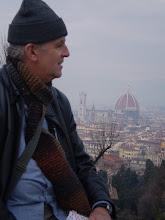A Very Brisbane Introduction (2007)

Our introduction to the city was by way of a CoachTrans driver named Steve who drove with one hand on the steering wheel, the other enthusiastically gesticulating as he regaled us with tales of his life and how it related to the history of Brisbane. This was pretty alarming because for most of the time he kept his eyes on the rearview mirror while simultaneously driving at a reckless speed. Even before leaving the airport grounds there were a couple of times the bus veered dangerously close to the traffic barrier or nosed right up to the car in front before coming to a shuddering halt. I spent the trip white-knuckled and nervous, my hand on the seat in front, bouncing sideways and forwards. I kept reminding myself, This is what he does for a living. He knows what he’s doing. He’s done this a hundred times.
It was quite strange, too, Steve linking himself to the wider history of the city. He couldn’t have been more than thirty-five, forty, which meant his experiences would have had absolutely no bearing on the development of the metropolis. Though that didn’t deter him one bit. In fact, it probably didn’t even occur to him, such was his assurance in the belief that his own personal history intersected perfectly with that of the suburbs passing outside the window.
Steve’s particular slant on history was an interesting one. Somehow or other almost every story he told ended with him drinking copious amounts of alcohol, passing out somewhere, then having to go to work with a hangover.
‘Don’t worry,’ he said, reassuring us. ‘That was a long time ago. Since I started with CoachTrans I’ve never turned up for work after a night on the town.’
Then he’d glance up at the large rearview mirror and rake us with a fiery mischievous shine to his eye which said, Yeah right!
He was, of course, big noting himself. He was a larrikin, a lad, one of the boys. It seemed to me he was acting out some stereotypical role, an Australian male of a certain age, where drinking is a badge you wear, and boasting about it a point of honour.
But he was full of useful information.
‘If you’re catching a taxi always ask how much the fair will be before you get in. If it’s five dollars over, that’s okay. If it’s ten they’re ripping you off.’
With us were three Americans. Mum and Dad and their daughter. Three hapless looking individuals if ever I saw them. They were the archetypal Americans, transported from the set of The Drew Carrey Show to a coach passing through the suburbs of Brisbane. Dad was heavy set, his hair was buzz cut, he was dressed in shorts and a t-shirt which said Australia. He peered nervously through chunky glasses.
‘Where you guys from?’ Steve asked.
‘Seattle,’ Dad said.
‘Ah, Seattle,’ Steve yelled, his hand yanking the steering wheel and sending us dangerously close to the medium strip. Then, after a pause, ‘I don’t know anything about Seattle. Is it nice?’
‘Yup!’
‘As nice as Australia?’
‘Yup!’
‘Well. I think Brisbane might change your mind!’
Steve, the cheerful ambassador of the city he loved. When the Americans laughed at this it was like a license to print money. The jokes poured forth, most of them directed at the Washingtonians.
‘Forget everything you’ve been told. You won’t see kangaroos hopping down the street outside you’re hotel. They’re in the bush. That’s what it’s for. The bush. It’s for kangaroos. And koalas.’
The Americans laughed uproariously at this. Or as uproariously as they thought polite. Mother sat clutching her bag in her lap, Daughter stuck out her heavy jaw and, looking a little deranged, grinned and showed her nice American teeth.
We headed into the city along Kingsford Smith Drive, a wide multi-lane highway that whisked us from the airport to our hotel in only twenty minutes or so. The lights of Brisbane’s towers gleamed cheerfully in the darkness, the multi-coloured patterns reflected in the wide river. Brisbane was on quite severe water restrictions – minimal garden watering, four-minute showers – but you wouldn’t have thought so by looking at the wide body of dark water flowing slowly beneath the polished moon.
Steve dropped us off at our hotel on Wickham Terrace. It was dark so we couldn’t see much. Though across the park in front of us, above the lush trees, signs atop tall buildings stood out starkly against the dark background. A rigorously scarlet Hitachi, a curved red and orange Telstra sign above a large illuminated digital clock, numerous glowing letters advertising world-class companies strewn like diamonds across the skyline. It was beautiful in a peculiarly artificial way. A man-made consumer paradise, visible for miles, blustering quietly about all the money that has been made and is yet to be made, millions of dollars invested in each stark and angular building. Brisbane, it seemed, was a city on the move, going places, grasping ever upwards for inclusion into a gloriously blissful future of affluence and plenty. And the way the buildings rose above the park seemed to suggest the supercedence of man over nature, the environment at humankind’s mercy, there but to provide all the resources needed to progress further than we’ve ever progressed before. It was strangely reassuring. Standing there on Wickham Terrace looking out on all this, it would be easy to believe everything would be okay in the end.

